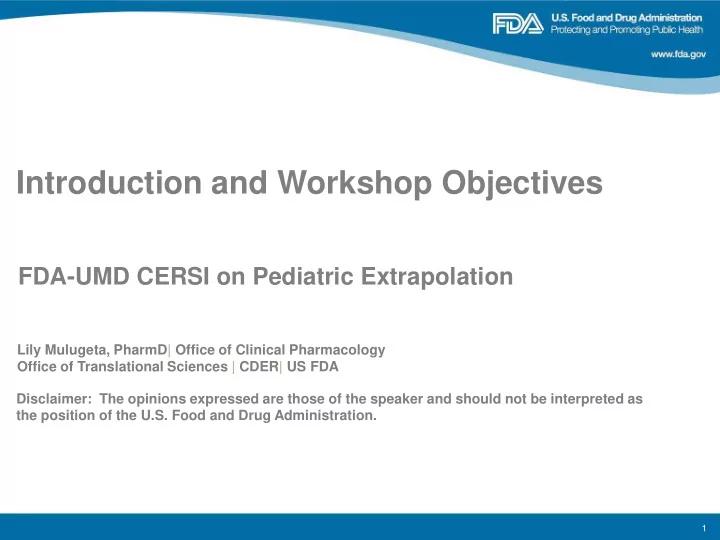

Introduction and Workshop Objectives FDA-UMD CERSI on Pediatric Extrapolation Lily Mulugeta, PharmD| Office of Clinical Pharmacology Office of Translational Sciences | CDER| US FDA Disclaimer: The opinions expressed are those of the speaker and should not be interpreted as the position of the U.S. Food and Drug Administration. 1
Acknowledgment • Workshop planning committee: – Dr. Nitin Mehrotra – Dr. Joga Gobburu – Dr. Vikram Sinha – Dr. Ann Anonsen – Dr. Jim Polli – Dr. Gilbert Burckart – Dr. Lynne Yao – Dr. Skip Nelson – Dr. Andrew Mulberg – Dr. Sarah Yim – Dr. Phil Sheridan – Dr. Kevin Krudys – Dr. Greg Reaman – Dr. Lisa Yanoff – Dr. Vasum Peiris – Dr. Barbara Buch • Office leadership (Dr. Issam Zineh) • Office of Commissioner (OCS/ORSI) 2
Challenges in Pediatric Drug Development Data limited situations Significant developmental/maturational changes › Small populations › Trial design considerations › Ethical and practical constraints › Dose selection Lag in Labeling High Failure Rate Pediatric exclusivity studies that did not demonstrate Difference between Adult NDA and efficacy (1998-2012) Pediatric Label (years) 1998-2007 2008-2015 7.55 8.21 N=69 N=99 Accessed November 2015 (OPT pediatric labeling database). Sample size N = 168 pediatric labels randomly selected Wharton et al. Pediatrics 2014 On average, pediatric labeling lags behind adult › Large number of failed trials approval by > 8 years › Reasons for failure are multifactorial 3
Pediatric Extrapolation: Regulatory and Statutory Milestones EMA Reflection Paper Introduces the use of a quantitative approach 05 04 2011 FDA Review Additional Review of application of Guidances extrapolation in pediatric 03 CDRH draft guidance on studies submitted to the pediatric extrapolation Agency btwn 1998-2008 Pediatric Clinical pharmacology draft guidance 1994 02 Pediatric Rule Introduced the concept of pediatric extrapolation Further reflected in Regulations (21 CFR 314.55) 01 CDER Guidances Exposure response guidance outlines general approach to pediatric extrapolation 4
The FDA Pediatric Extrapolation Framework Reasonable to assume (pediatrics vs adults) • Similar disease progression? • Similar response to intervention? NO TO EITHER YES TO BOTH • PK study Reasonable to assume similar • Safety/efficacy study E-R in pediatrics and adults? No extrapolation NO • PK study (dose to achieve levels similar to adults) Is there a PD measurement that can • Safety study be used to predict efficacy? Full Extrapolation YES NO • PK/PD study to get ER for PD measurement • PK study • Safety/efficacy study • Safety study Partial Extrapolation Partial Extrapolation 5
Opportunities to Optimize Pediatric Drug Development Systematic Application Leverage Rich Prior Early Planning for of extrapolation* Data Pediatric studies ~60% of pediatric programs Adult clinical trial data require at least 1 ~ 300 initial Pediatric Study confirmatory pivotal phase 3 Plans submitted annually at end of Access to data from pediatric study Phase 2 in adults trials from >600 Need for consistent approach development programs to defining and establishing submitted to the Agency over disease and response similarity the last 2 decades Dunne et al. Pediatrics 2011 Systematic assessment of prior data to support extrapolation Ensure collection of informative data in adult phase 3 trials and pediatric trials Use of innovative approaches/tools › Modeling and simulation › Bayesian approaches 6
Building Evidence to Support Pediatric Extrapolation Strength and limitations of different level evidence/approaches to support disease and response similarity? In silico models Disease progression models, clinical trial Human data simulation Prevalence, etiology, clinical manifestation, severity, disease progression, biomarker, clinical endpoints Nonclinical data animal disease models, in-vitro data, mechanism of action Statistical approaches Bayesian approaches 7
Minimizing Uncertainties in Pediatric Extrapolation Assumptions Stating extrapolation assumptions explicitly and designing pediatric trials to validate assumptions By late next month, Number of surgeries you will have had over a dozen surgeries. Better ? get a bulk rate on deductibles. 8
Workshop Outline 1. Define critical data to provide evidence of disease/response similarity 2. Discuss the added value of quantitative assessment (vs. qualitative) Goals 3. Identify conditions to serve as useful model to demonstrate proof of principle in the use of quantitative data in support of pediatric extrapolation 4. Discuss challenges with conducting a systematic assessment and potential path forward Setting the stage 1 st session: 3 Case examples (varying level of evidence) Panel discussion 2 nd session: Statistical approaches & role of M/S Panel discussion & Future direction
In Memoriam Dr. Jack Pellock, Neurologist (VCU) and co-chair of the Pediatric Epilepsy Academic Consortium on Extrapolation (PEACE) 10
Recommend
More recommend